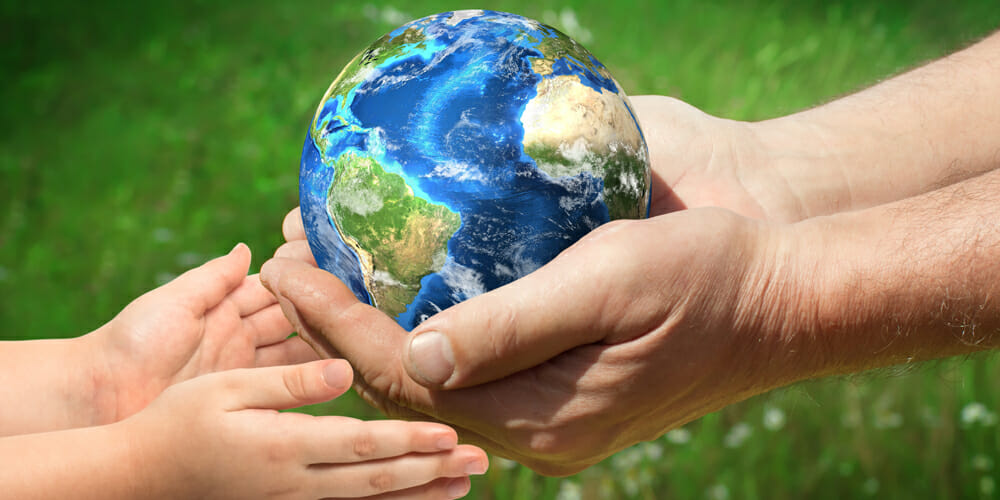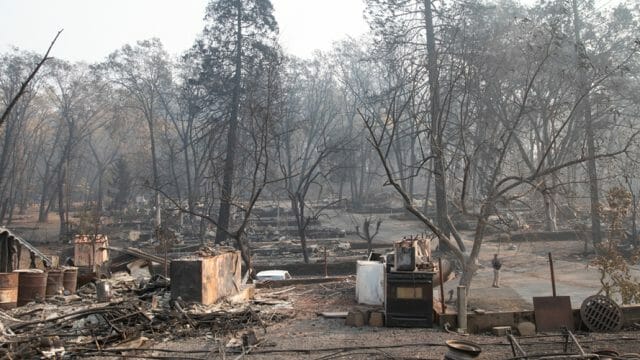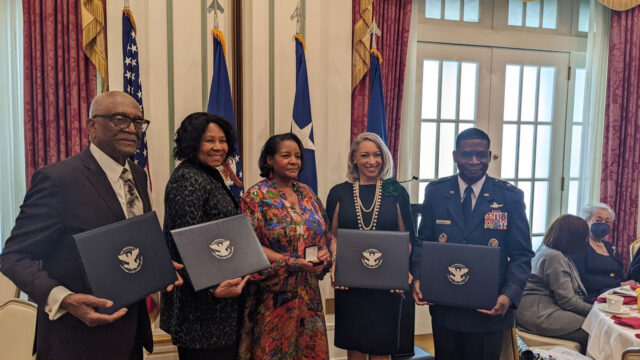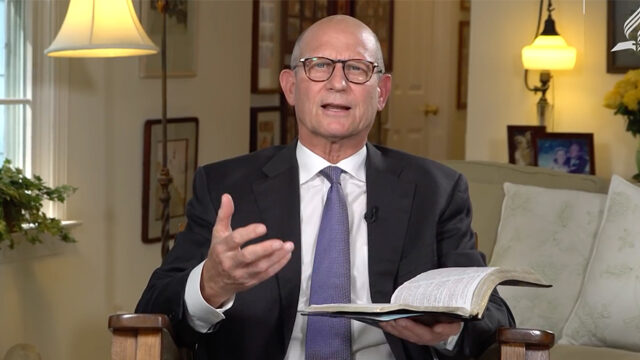Does the Bible have something to say about the way we relate to our planet?

The world must have seemed like a big place to Helga Estby, a Norwegian woman who walked across America in the year 1896. Helga immigrated to the United States with her parents in 1871 at the age of 11.
On May 5, 1896, at the age of nearly 36, Helga and her 18-year-old daughter Clara set out to walk across the United States. They started from Mica Creek, in far eastern Washington State, and walked an estimated 3,500 miles to New York City, where they arrived on December 24.
The mother and daughter may have been the first to walk intentionally across the United States on foot. Since then, numerous people have repeated the feat, usually requiring from five to seven months. From the point of view of a person living in 1896, the world would seem big and its resources virtually unlimited. But this view has changed.
We now recognize the world is not so big, and its resources very definitely are limited. Part of the credit for this comes from a photo known as “The Blue Marble.” On December 7, 1972, the Apollo 17 crew took a photograph of our planet, showing it to be a blue island in space.
Although it was not the first photo of the earth from space, it captured the attention of the American public in an unprecedented way. The release of the photograph coincided with a surge in interest in environmental protection and quickly became an icon of the environmental movement.
Our view of the earth began to shift from one of unlimited potential to one of a fragile blue island in space.
Concern for the Environment
Concern for the environment continues to occupy a place in current culture. We hear frequent warnings of global warming and its possible relationship to human use of fossil fuels, sunspot activity, or variations in earth’s orbit.
As the human population increases, other species are crowded out and lost to extinction. Fears of an ongoing “mass extinction” are often expressed, with varied estimates of how many species are threatened with extinction before we even discover their existence.
Many voices oppose the expansion of human population at the expense of other species, sometimes resorting to reducing humans to the level of other species. At its extreme, some have even promoted the idea that animals such as chimpanzees should be regarded as “persons” in the same sense as humans.
Fortunately, the courts have not agreed, perhaps aware that such a precedent could easily be applied to gorillas, then monkeys, dogs, horses, pigs, and so on, with no obvious criteria available to distinguish those with legal accountability for their actions from those without it.
Meanwhile, poverty and pollution, both related to environmental degradation, reduce the quality of life for increasing numbers of humans, which increases human misery and threatens to destabilize society.
Amid the turmoil and challenges of caring for our world, what is an appropriate Christian response?
Bible Principles for Responsible Care
Fortunately, the biblical story of creation provides some important principles for responsible care of “Island Earth.” For example, Genesis indicates that God regards the animals with favor. After creating the animals and before humans were created, God considered the world to be “good.” This shows that the creatures with which we share this world, along with their habitats, have value in themselves.
Another point from the creation story is that human beings were put in charge of the world. God gave them “dominion” over the other creatures. The word dominion implies a kind of kingship, which means we are to function as kings on behalf of the other animals.
Kings properly use their authority to manage their subjects for the common good. Our mandate from Creation is to use our power to enhance the quality of life, not only for ourselves but also for the other species that share the planet with us.
It is true that we sometimes have to restrain or even kill animals, but we do so with a sense of regret, looking forward to the promised new creation, when such things will no longer be necessary. We should never cause unnecessary suffering, even to rats and other “nuisance” animals, because we serve and represent a Creator who values all creatures and intended them to live in harmony with one another.
Recognition of humans as created in the image of God is a third point that guides our care for the environment. Every human being should be treated with respect and dignity out of respect to the One whose image they bear. Poverty, violence, and suffering had no place in the “very good” earth God created. These atrocities are the result of human choices, and all who recognize their calling as stewards of creation will work to oppose them.
From these biblical principles we can derive guidelines for managing our world and its resources. This includes our treatment of the physical environment, the diverse biota with which we coexist, and our fellow humans.
Things We Can Control
We may not be able to control some aspects of the physical environment such as sunlight and the earth’s orbit, but human beings do have powerful effects on the quality of the water, soil, and atmosphere.
Waste management is a problem we have still not solved, as seen in the “garbage patches” of our oceans, the smog in the air of our cities, the industrial pollution in our soil and groundwater, and the problem of safely storing radioactive waste products. We can all see evidence of changes in the climate. Whether these are due to human activities, to natural cycles, or both, we can carefully evaluate our use of resources and plan how to change our habits to respond to changes in climate.
As individuals, we can reduce consumption, recycle materials, and properly dispose of household wastes. As citizens and taxpayers, we can support responsible efforts to manage waste disposal, maintain supplies of clean water, and work to eliminate pollution from industries and automobiles. Each of these methods is consistent with the biblical principle that we are given the task of being stewards of God’s creation.
There are many ways we can care for the other living organisms. Setting aside land in wilderness areas helps preserve diverse habitats and provides us with opportunities for healthful outdoor activities. Wildlife refuges provide safe resting places for birds in migration and habitats for the plants and animals of the region. Habitat corridors linking wildlife preserves improve the survival chances of threatened species.
Animals used in research should be treated well and not left to suffer. Domesticated animals should be treated with care, even when raised for food purposes. Pet predators can be spayed or neutered to prevent the destruction of smaller creatures, such as by feral cats. Each of these activities, along with many others, is evidence that we take seriously our responsibility as stewards of “Island Earth.”
Care for Other Humans
Care for other human beings should be a high priority for we who have been charged to exercise dominion in our world. This includes respecting the rights of others to the basic freedoms: freedom of speech; freedom of religion; freedom of the press; freedom of assembly; and freedom to participate in the political process.
We should endeavor to provide an opportunity to each person to work to support themselves and their families. We should provide means to reduce suffering from disease, poverty, and environmental degradation. All humans are part of one family, and family members take care of one another.
Caring for the environment is a natural concern for those who accept the biblical teaching of a six-day creation, in which God created a good physical environment, filled the world with diverse kinds of plants and animals, and created humans in His image and gave them the responsibility to act as stewards on His behalf.
Our understanding of this responsibility has increased over the years as we have come to realize that our world and its resources are finite and that we truly live on an island called earth.








